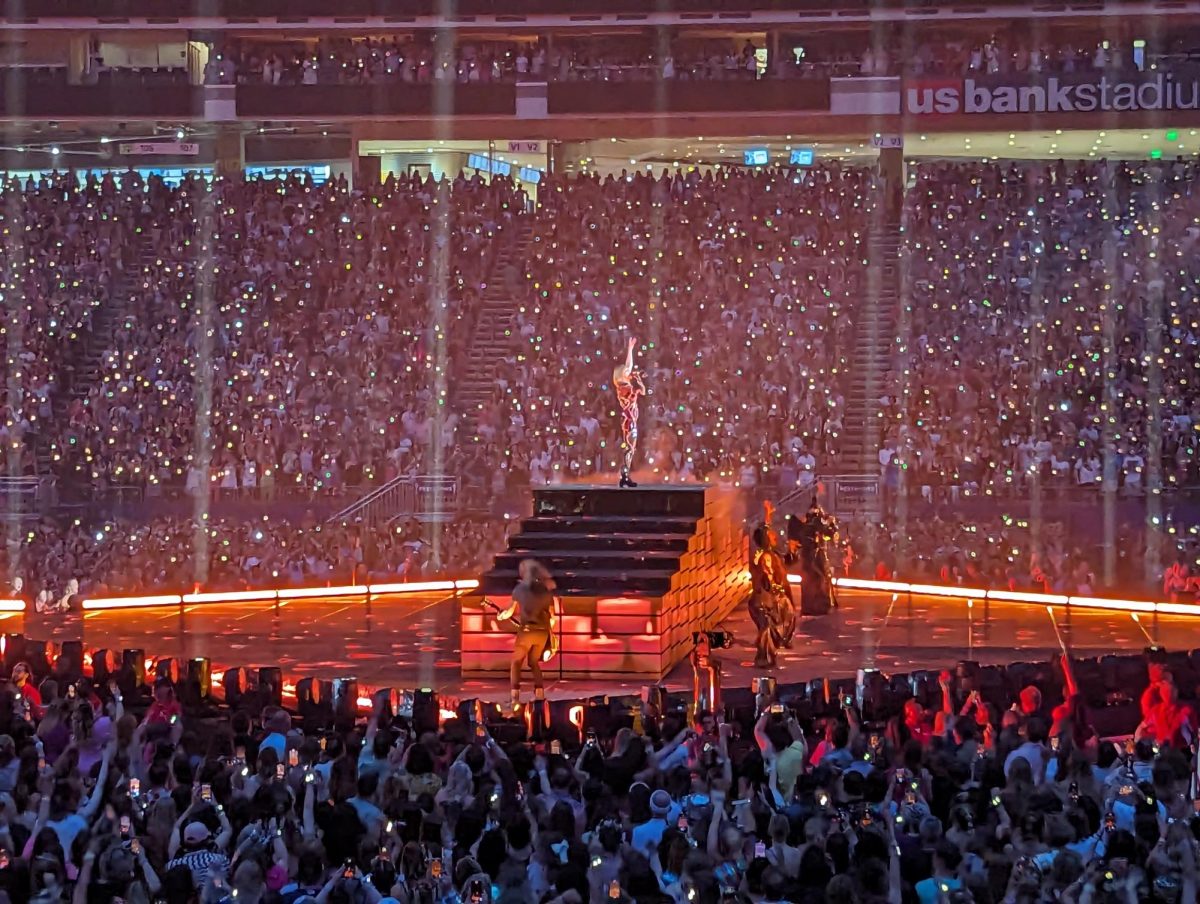Celebrities are more well known than most political figures in this day and age. Walk into a classroom and ask the students inside if they can name their local governor. A couple of hands, maybe some slight murmurs may arise from the classroom, but the majority remain hushed. Pull up a picture of Dwayne ‘The Rock’ Johnson, however, and many more will start to take notice. Now imagine this scenario, but on the scale of today’s society. A survey conducted by reporters with the New York Times asked hundreds of thousands of its readers to attempt identifying a list of 52 people composed of politicians, athletes and celebrities.
On average, Americans did considerably worse at identifying politicians than that of partisan followers and avid news readers. For example, many avid Times readers could identify former British Prime minister Boris Johnson noticeably better, while they recognized more modern celebrities, such as popular YouTubers, much worse. However, the median age for an average Times reader is 54 years old, which is a significant minority of the overall population.
In today’s hyperconnected world, the influence of celebrities extends far beyond the realms of entertainment and into the fabric of society itself. From influencing consumer behavior to contributing to political discourse, celebrities wield significant power in today’s society and hold a unique position of influence. However, some critics agree otherwise, fearing the immense and potentially hazardous grasp they have on society. Exploring the role of celebrities and how they manage their platforms raises questions about how they can effectively navigate the complexities of brand appeal, politics, and the economy.

Celebrities possess a magnetic appeal that transcends borders and demographics. Their status as cultural icons affords them unparalleled visibility and reach, making them powerful drivers of consumer trends and brand loyalty. Endorsements from A-list stars can elevate a product’s status, increase sales, and shape consumer perceptions. Cristiano Ronaldo’s simple gesture at a press conference, where he removed two Coca-Cola bottles and encouraged people to “drink water” instead caused Coca-Cola’s stock to fall by 1.6%, costing them around $4 billion in the short-term. Whether it’s a fashion label, a luxury brand, or a social cause, celebrities have the ability to amplify messages and spur action.
Take a look at Michael Jordan’s brand, ‘Jordan,’ for example. In 1984, Nike sales had slipped nearly 30 percent from the previous year. Nike’s image was fading in the NBA, and popularity was dropping fast. This changed after they signed an explosive rookie, hailing from the Chicago Bulls. Jordan’s first shoe, the Air Jordan 1, transformed the company; first-year shoe sales totaled $126 million, a figure more than forty times Nike’s three-year sales estimate. Fast forward to last year: Nike grossed over $46 billion in sales, of which $5 billion was purely from their work with Jordan. Research shows that a $1,000 investment in pre – Jordan Nike could have purchased around 7,000 shares of Nike, which would be worth millions today. With the retro-revolutionary brand of Jordan, Nike was able to grow from a simple foot locker company to a massive sports conglomerate.
Beyond just their role in shaping consumer preferences, celebrities play a significant role in the global economy. Their collaborations with brands, sponsorship deals, and entrepreneurial ventures contribute to economic growth and employment opportunities. Taylor Swift is a great example of this. Her recent Eras Tour recently broke the record as the highest-grossing tour ever, with a whopping $1 billion of revenue and numbers projecting that she is bringing nearly $6 billion dollars into the economies of the cities the tour stopped in. In fact, studies show that for every $100 spent on the average show, an additional $300 is spent on necessities associated with traveling and attending the tour, such as hotels, food, and transportation. However, studies show that Swift’s fanbase, otherwise known as “Swifties,” generated an additional $1,300 on average in additional expenses, nearly 5 times more than the average ratio. Combined with all the additional merchandise and concert-themed outfits of her fans, Taylor’s tour culminated to more than the GDP of dozens of nations in one tour.

However, with economic power comes social responsibility. As public figures with immense wealth and influence, celebrities have a duty to use their resources for the greater good. Many celebrities have embraced philanthropy, establishing charitable foundations, and supporting causes. Swift regularly donates to food banks while on her tours, providing meals for hundreds of thousands of people in every city she visits. Socialites and mega-billionaires, such as Bill Gates, make a point to engage in charity. Since 1994, Bill Gates has donated more than $50 billion dollars to eradicate diseases, promote education and advance equality. Celebrities can drive positive change and inspire others to join the fight against inequality and injustice by leveraging their platforms for social impact.
Their influence does not stop in just the economic sector, however. In recent years, celebrities have increasingly stepped into the political arena, leveraging their influence to champion causes and mobilize support. Their endorsement of political candidates, advocacy for social justice issues, and participation in grassroots movements can galvanize public opinion and drive voter turnout. Almost a year ago, Swift posted to her Instagram, where she has 272 million followers. “I’ve been so lucky to see so many of you guys at my U.S. shows recently. I’ve heard you raise your voices, and I know how powerful they are,” she wrote in her story. “Make sure you’re ready to use them in our elections this year!”
Within hours, vote.org recorded more than 35,000 registrations, marking the highest turnout since 2020. Andrea Hailey, CEO of the nonpartisan nonprofit, hailed it as a “highly encouraging sign of voter enthusiasm,” particularly among newly eligible voters. Swift’s influence was glaring as Vote.org reported a 1,226% jump in participation in the hour following her post.
Swift’s advocacy for voter registration is not an isolated incident, but part of the broader trend of celebrity engagement in social and political issues. While Swift had previously shied away from political endorsements, her recent activism reflects a growing willingness among celebrities to leverage their platforms for societal impact, potentially endorsing politicians that align with their views. With her visibility at a peak during the Eras Tour and the release of her re-recorded albums, Swift’s advocacy underscores the potential for celebrities to drive positive change and inspire civic engagement.
Amidst the allure of celebrity influence lies an ethical dilemma: should celebrities use their campaigns for societal influence, or should they remain neutral and apolitical? While some argue that celebrities have a moral obligation to speak out on issues of social importance, others caution against the dangers of politicizing entertainment and commercial endeavors. In an era of mass polarization, where an increasing social media and increased exposure to the internet have critics wondering whether celebrities and mass influencers should take sides in fear of increasing the divide.
Celebrities, such as Taylor Swift, understand the potential hazards of their impact with their audience and use it wisely. Others use it for personal gain. Elon Musk’s infamous Dogecoin scandal still rings today in a $258 billion dollar lawsuit, where investors accuse Musk of deliberately driving up Dogecoin’s price by 36,000% for years before letting it crash in an elaborate pump-and-dump scheme, where Musk advertised Dogecoin by doing things like making the icon his profile picture in twitter and creating many positive tweets about it, causing a frenzy of investment that eventually fell sharply, causing many investors to suffer tremendous losses.
Ultimately, the decision rests with individual celebrities, who must weigh the potential risks and rewards of using their platforms for advocacy. Regardless of their choice, transparency, authenticity, and a genuine commitment to social responsibility are essential.
Overall, celebrities possess a unique ability to shape public opinion, influence consumer behavior, and drive social change. While many fear their involvement in politics in fear of making it even more trend-driven than it already is, their popularity also presents an opportunity to address pressing societal issues and promote positive change. By leveraging their platforms for social impact, celebrities can inspire millions of fans to engage in meaningful action and contribute to a more just and equitable world. As stewards of their influence, celebrities must navigate the complexities of brand appeal, politics, and societal impact with integrity, transparency, and a genuine commitment to making a difference.
In today’s hyperconnected world, the influence of celebrities extends far beyond the realms of entertainment and into the fabric of society itself. From influencing consumer behavior to contributing to political discourse, celebrities wield significant power in today’s society and hold a unique position of influence.

